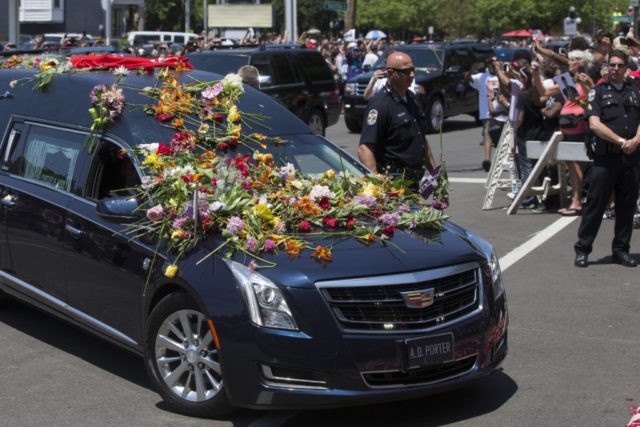Beneath American and Olympic flags, mourners said goodbye to Muhammad Ali at a Louisville, Kentucky, arena on Friday afternoon.
Comedian Billy Crystal, President Bill Clinton, and a host of friends, relatives, and loved ones paid tribute in words in a service that lasted more than three hours.
The audience broke a prolonged silence to give President Bill Clinton a round of applause before an Islamic imam, Zaid Shakir offered a prayer in Arabic that he translated. Imam Hamzah Abdul Malik then read a few verses from the Koran in Arabic in a dronish chant as other religious leaders sat looking on the dais at the interfaith service. A young woman, Ayah Kutmah, who raises money for medical supplies for Syrians caught in conflict, translated the passages, which discussed submission to God and instructed listeners to “repel ugliness with goodness.”
Rev. Kevin Cosby preached, “The Constitution said we were three-fifths of a person,” cited racial stereotypes in Amos ‘n’ Andy, and cited an unsung verse in the “Star-Spangled Banner” that he claimed disparaged blacks. “Then from Louisville,” he explained, “emerged a silver tongue poet.” Cosby cited Ali’s legendary self-love as an example that helped African Americans to love themselves. The reverend, applause interrupting his charismatic cadence, declared, “He dared to affirm the beauty of blackness.”
“It’s hard for this poor, old senator to follow that,” Senator Orrin Hatch noted. He discussed setting up a meeting between Ali and former middleweight champion Gene Fullmer. The Republican from Utah lauded Ali’s support for civil rights and religious freedom, his effectiveness as an emissary for Islam, and transcendence of “binary” partisanship. “He was not Muhammad Ali the prize fighter,” Hatch explained. “He was Muhammad Ali, ‘The Greatest.'”
A few minutes after Hatch touted Ali as a figure who crossed party lines for good causes, Rabbi Michael Lerner used the service as an occasion to unleash a political rant. “How do we honor Muhammad Ali?” Lerner asked. “The way to honor Muhammad Ali is to be Muhammad Ali today.” He said this means we “tell the one percent who own 80 percent of the wealth of this country that it’s time to share their wealth,” “close our military bases around the world,” and “imprison those who authorize torture,” among other demands. Lerner said “it’s time to create a guaranteed income,” “help create a Palestinian state,” and rid society of “racist police” and “racist judges,” and publicly fund all political campaigns. When he spoke of the next president of the United States, he used the female pronoun and said, “We will not tolerate politicians or anyone else putting down Muslims, or blaming Muslims for a few people.”
Attallah Shabazz, daughter of Malcolm X, recalled, “Muhammad Ali was the last of a fraternity of amazing men bequeathed to me from my dad.” Valerie Jarrett, reading a letter from President Barack Obama, said of Ali: “He was our most basic freedoms—religion, speech, spirit.” The president credited with helping “inspire a young, mixed kid with a funny name to believe he could be anything, even the president of the United States. Muhammad Ali was America. Muhammad Ali will always be America.”
The former heavyweight champion’s widow, Lonnie Ali, told the famous story of when a white Louisville policeman encouraged a 12-year-old Cassius Clay to join a boxing gym after a thief stole his bike. She said that when a cop and an inner-city kid come together “miracles can happen.” She noted that her husband never turned to violence outside of the ring despite the violent times in which he lived. The widow eulogized her husband by saying his life serves as “proof that adversity can make you stronger.”
“Thank you ladies and gentlemen, we’re at the halfway point. I was clean-shaven when this started,” Billy Crystal said almost two-and-a-half hours into the event. The bearded Crystal recalled meeting Ali in 1974 because of a comedy routine in which he imitated the champ and Howard Cosell. The comedian noted, “Every one of his fights was the aura of a Super Bowl.”
Television personality Bryant Gumbel asked, “What does it say of a man, any man, that he can go from one of a country’s most polarizing figures to one of its most beloved?”
President Bill Clinton called Muhammad Ali “a lot of fun to be around” and “a universal soldier for our common humanity.” Clinton deemed the second part of his life more significant than the first part because he fought against a more powerful foe in Parkinson’s disease. “How do some people refuse to become victims and rise from every defeat?” Clinton asked. “I think he decided very young to write his whole life story.”
Ali died of septic shock at 74 on June 3 after a long battle with Parkinson’s. A three-time lineal heavyweight champion, an Olympic gold medalist at lightweight, and a figure so larger than life that he boasted his own cartoon, candy bar, and movies made about his life, Ali retired for the last time with a 56-5 record over a professional career that spanned 21 years.

COMMENTS
Please let us know if you're having issues with commenting.